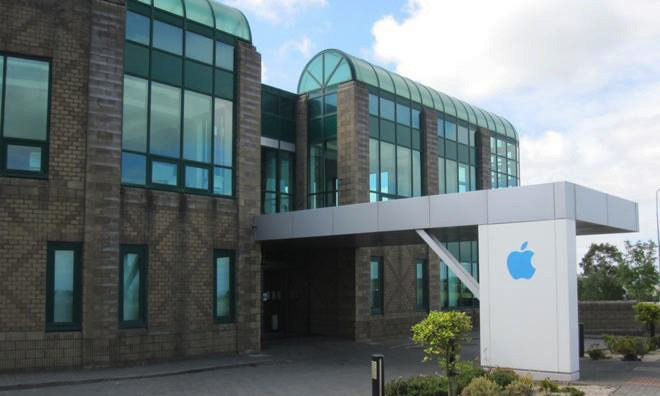Apple ranks as Ireland's biggest company thanks to funneled international income
Apple has claimed the top spot on an Irish Times list of the country's biggest companies in 2019, if largely because of its tax avoidance strategy.

The iPhone maker recorded sales of 119 billion euros, or about $133.67 billion, Business World noted. That put it far ahead of other tech multinationals like Google ($35.95 billion) and Facebook ($21.01 billion).
Apple's local hardware and service income likely represents a slim fraction of reported sales. The country's entire population is a little over 4.84 million, and the company has no first-party stores, even in the capital of Dublin or near its regional Cork headquarters.
Instead most of its Irish income is actually from overseas, funneled through the country to exploit tax loopholes. The only exception to this is the U.S., Apple's global homebase.
In 2016 the European Commission ruled that Ireland extended illegal state aid to Apple in the form of preferential tax breaks. While Apple and the Irish government are still fighting the decision, Apple has already paid Ireland a $15 billion lump sum to avoid any additional E.U. actions.
Critics have long worried that tech multinationals like Apple aren't paying their fair share of taxes in the countries they operate in, causing government budget shortfalls in areas like healthcare, education, and infrastructure. Various European proposals could see Apple subject to so-called "GAFA" (Google, Apple, Facebook, and Amazon) taxes, though to date Sweden, Finland, Ireland, and Denmark have blocked a blanket E.U. tax.
CEO Tim Cook has maintained that Apple pays "all of the taxes we owe," and that it even follows "the spirit of the laws," despite its use of loopholes and previous rulings on back taxes.

The iPhone maker recorded sales of 119 billion euros, or about $133.67 billion, Business World noted. That put it far ahead of other tech multinationals like Google ($35.95 billion) and Facebook ($21.01 billion).
Apple's local hardware and service income likely represents a slim fraction of reported sales. The country's entire population is a little over 4.84 million, and the company has no first-party stores, even in the capital of Dublin or near its regional Cork headquarters.
Instead most of its Irish income is actually from overseas, funneled through the country to exploit tax loopholes. The only exception to this is the U.S., Apple's global homebase.
In 2016 the European Commission ruled that Ireland extended illegal state aid to Apple in the form of preferential tax breaks. While Apple and the Irish government are still fighting the decision, Apple has already paid Ireland a $15 billion lump sum to avoid any additional E.U. actions.
Critics have long worried that tech multinationals like Apple aren't paying their fair share of taxes in the countries they operate in, causing government budget shortfalls in areas like healthcare, education, and infrastructure. Various European proposals could see Apple subject to so-called "GAFA" (Google, Apple, Facebook, and Amazon) taxes, though to date Sweden, Finland, Ireland, and Denmark have blocked a blanket E.U. tax.
CEO Tim Cook has maintained that Apple pays "all of the taxes we owe," and that it even follows "the spirit of the laws," despite its use of loopholes and previous rulings on back taxes.

Comments
I know that when I file my taxes each year, you can bet that I am looking to pay as little as required and I will look for as many deductions as possible.
That's called being smart.
I'm curious how much the presence of these big companies would be missed if they left because of unreasonable greediness by political bodies in these countries?
Tax minimization is a good strategy because governments are wasteful. Need to keep them in check.
Apple isn’t “funnelling” anything. Taxes are due, like all corporations, in the HQ: Ireland or the US if repatriated . The countries where Apple sells can get taxes from sales on Vat (which is significant) , and on any retail profit made by Apple or other resellers. Then the rest of the profit is charged with tax at HQ. Same with BMW. It’s the way corporation tax works.
Apple was in fact following the law. Or, well, Irish law.
The trouble is: Ireland was not following EU law (or rules -- whatever).
There have always been "offshore" operations that bypass laws of finance and taxation. And, those who use them tend to be regarded suspiciously.
But, the fact here remains: Apple reaped the benefits of operating in the EU but avoided paying the required taxes.
Taking land and gold for themselves used to be a tactic for Kings and Queens while the peasants were expected to cough up even more to "support the Kingdom" so the Dukes and Duchesses could continue their lifestyles. Now it's taking a people's money from their country off to a foreign land to enrich no one but an already wealthy beyond any possible need multinational and the ridiculously paid executive management who run them with the approval of the well-off investors. Meanwhile the "peasants" back home are expected to cough up more taxes themselves to "support their countries" and allow the already wealthy to continue their lifestyles, and assert power to control the flow of money which leads to the above. What a great plan.
https://www.finfacts-blog.com/2019/05/the-fiction-in-irish-times-top-1000.html
Google as rank 2 thanks to booking almost a third of its annual global revenues in Ireland is also a fantasy, which was dubbed by Paul Krugman, the New York Times columnist, as leprechaun economics in 2016.
Michael Hennigan